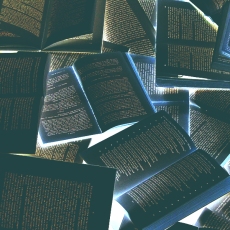| Autori |
Název |
|
P. Černo |
Clearing Restarting Automata and Grammatical Inference |
|
Proceedings of the Eleventh International Conference on Grammatical Inference (ICGI 2012), September 5-8, 2012, University of Maryland, College Park, United States, JMLR, Vol. 21, 54-68. |
|
Abstrakt: Clearing and subword-clearing restarting automata are linguistically motivated
models of automata. We investigate the problem of grammatical inference for such
automata based on the given set of positive and negative samples.
We show that it is possible to identify these models in the limit. In this
way we can learn a large class of languages. On the other hand, we prove that
the task of finding a clearing restarting automaton consistent with a
given set of positive and negative samples is NP-hard, provided that we
impose an upper bound on the width of its instructions. |
|
Odkazy: BibTeX, JMLR Proceedings, Fulltext, Presentation |
|
P. Černo |
Clearing Restarting Automata and Grammatical Inference (Technical Report) |
|
Technical report, 1/2012, Charles University, Faculty of Mathematics and Physics, Prague. |
|
Abstrakt: See above |
|
Odkazy: BibTeX, Fulltext |
|
I. Mrázová, M. Kukačka |
Can Deep Neural Networks Discover Meaningful Pattern Features? |
|
In Procedia Computer Science, Vol. 12, pp. 194-199, 2012. |
|
Abstrakt: Recent advances in the area of deep neural networks brought a lot of attention
to some of the key issues important for their design. In particular for 2D-shapes,
their accuracy has been shown to outperform all other classifiers - e.g., in the
German Traffic Sign Competition run by IJCNN 2011. On the other hand, their
training may be quite cumbersome and the structure of the network has to be
chosen beforehand. This paper introduces a new sensitivity-based approach capable
of picking the right image features from a pre-trained SOM-like feature detector.
Experimental results obtained so far for hand-written digit recognition show that
pruned network architectures impact a transparent representation of the features
actually present in the data while improving network robustness. |
|
Odkazy: BibTeX, ScienceDirect |
|
I. Mrázová, M. Kukačka |
Can Deep Convolutional Neural Networks Discover Meaningful Pattern Features? |
|
Technical report No 2012/1/KTIML, MFF UK, 12 p., 2012. |
|
Abstrakt: Recent advances in the area of deep neural networks brought a lot of attention
to some of the key issues important for their design. In particular for 2D-shapes,
their accuracy has been shown to outperform all other classifiers - e.g., in the German
Traffic Sign competition run by IJCNN 2011. While the majority of classical image
processing techniques is based on carefully pre-selected image features, convolutional
neural networks are, namely, designed to learn local features autonomously.
On the other hand, the entire training process may be quite cumbersome and the
structure of the network has to be chosen beforehand. Our paper introduces a new
sensitivity-based approach capable of picking the right image features from a pretrained
SOM-like feature detector. Experimental results obtained so far for two case
studies on face and hand-written digit recognition show that pruned network architectures
impact a transparent representation of the features actually present in the data
while improving network robustness. |
|
Odkazy: BibTeX |
|
F. Otto, P. Černo, F. Mráz |
Limited Context Restarting Automata and McNaughton Families of Languages |
|
In Rudolf Freund, Markus Holzer, Bianca Truthe, and Ulrich Ultes-Nitsche, editors, Workshop on Non-Classical Models of Automata and Applications (NCMA), books@ocg.at, pages 165-180. Österreichisches Computer Gesellschaft, 2012. |
|
Abstrakt: In the literature various types of restarting automata have been studied
that are based on contextual rewriting.
A word w is accepted by such an automaton if, starting from the initial
configuration that corresponds to input w,
the word w is reduced to the empty word within a finite number
of applications of these contextual rewritings.
This approach is reminiscent of the notion of McNaughton families of languages.
Here we put the aforementioned types of restarting automata into the
context of McNaughton families of languages,
relating the classes of languages accepted by these automata
in particular to the class GCSL of growing context-sensitive languages
and to the class CRL of Church-Rosser languages. |
|
Odkazy: BibTeX, NCMA 2012, Presentation |
|
J. Pihera |
Artificial neural networks and their application for 3D-data processing |
|
MSc-thesis (supervised by I. Mrazova), KTIML MFF UK, 135 p., 2012. This thesis won Dean's Award for the Best MSc-thesis in the Field of Computer Science. |
|
Abstrakt: Neural networks represent a powerful means capable of processing various multi-media
data. Two applications of artificial neural networks to 3D surface models are examined
in this thesis – detection of significant features in 3D data and model classification. The
theoretical review of existing self-organizing neural networks is presented and followed
by description of feed-forward neural networks and convolutional neural networks (CNN).
A novel modification of the existing model – N-dimensional convolutional neural networks
(ND-CNN) – is introduced. The proposed ND-CNN model is enhanced by an existing technique
for enforced knowledge representation. The developed theoretical methods are assessed
on supporting experiments with scanned 3D face models. The first experiment focuses on
automatic detection of significant facial features while the second experiment performs
classification of the models by their gender using the CNN and ND-CNN. |
|
Odkazy: Dean's Award |
 Anglicky
Anglicky  Slovensky
Slovensky 